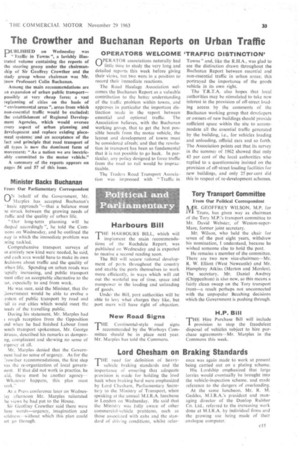The Crowther and Buchanan Reports on Urban Traffic
Page 35

If you've noticed an error in this article please click here to report it so we can fix it.
jou MASHED on Wednesday was "Traffic in Towns", a lavishly illustrated volume containing the reports of the steering group under the chairmanOtip of Sir Geoffrey Crowther and the 5tudy group whose chairman was Mr. (now Professor) Colin Buchanan.
Among the main recommendations are an expansion of urban public transport— possibly at very cheap fares; a vast replanning of cities on the basis of environmental areas", areas from which non-essential traffic would be excluded; the establishment of Regional Development Agencies, which would oversee every aspect of urban planning and development and replace existing piecemeal systems; and an acceptance of the fact and principle that road transport of all types is now the dominant form of movement: "As a nation we are inextricably committed to the motor vehicle."
A summary of the reports appears on pages 56 and 57 of this issue.
Minister Backs Buchanan
From Our Parliamentary Correspondent
(IN behalf of the Government, Mr. Marples has accepted Buchanan's basic approach "—that a balance must lc struck between the growing needs of :raffle and the quality of urban life.
"Our long-term planning will be thaped accordingly ", he told the Cornnons on Wednesday, arid he outlined the xay in which the immediate problem was 3eing tackled.
Comprehensive transport surveys of in An ti rely new kind were needed, he said, tnd each area would have to make its own Jecisions about traffic and the quality of irban life. Spending on urban roads was -apidly increasing, and public transport mist offer an acceptable alternative to the
especially to and from work.
He was sure, said the Minister, that the liovernment would be able to evolve a iystern of public transport by road and .ail in our cities which would meet the ieeds of the travelling public.
During his statement, Mr. Marples had rough reception from the Opposition ind when he had finished Labour front )ench transport spokesman, Mr. George ltrauss, described his remarks as dampenng, complacent and showing no sense of trgency at all.
Mr. Marples denied that the Governnent had no sense of urgency. As for the 7rovither recommendations, the first step vas the re-organization of local governnent. If that did not work in Practice, he aid, there must be another agency- • Whatever happens, this plan must so rk '
At a Press conference later on Wedneslay afternoon Mr. Marples reiterated he views he had put to the House.
Sir Geoffrey Crowther said there were hree words—urgency, imagination and oldness—without which this plan' could lot go through.
OPERATORS WELCOME 'TRAFFIC DISTINCTION'
CAPERATOR associations naturally had little time to study the very long and detailed reports this week before giving their views, but two were in a position to record their immediate reactions.
The Road Haulage Association welcomes the Buchanan Report as a valuable contribution to the better understanding of the traffic problem within towns, and approves in particular the important distinction made in the report between essential and optional traffic. The Association believes, with the Buchanan working group, that to get the best possible benefit from the motor vehicle, the layout and development of towns must he considered afresh; and that the revolution in transport has been so fundamental that it is not possible to go back. In particular, any policy designed to force traffic from the road to rail would be impracticable.
The Traders Road Transport Association was impressed with "Traffic in Towns" and, like the R.H.A., was glad to see the distinction drawn throughout the Buchanan Report between essential and non-essential traffic in urban areas; this portrayed the importance of the goods vehicle in its own right.
The T.R.T.A. also hopes that local authorities may be stimulated to take new interest in the provision of off-street loading access by the comments of the Buchanan working group that developers or owners of new buildings should provide sufficient space within the site to accommodate all the essential traffic generated by the building, i,e., for vehicles loading and unloading, official cars and so forth. The Association points out that its survey in the summer of 1962 showed that only 43 per cent of the local authorities who replied to a questionnaire insisted on the provision of off-street loading facilities for new buildings, and only 25 per cent did this in respect of re-development schemes.








































































































